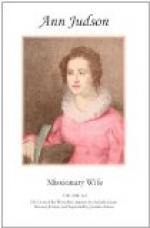Mr. Judson, a graduate of Brown University, “an ardent and aspiring scholar,” was one of four or five young men in the then newly founded Theological Seminary at Andover, whose minds had become deeply impressed with the wants of the heathen, and a desire to go and labor among them. By their earnestness and perseverance, they so far awakened an interest in their project, that a Board of Commissioners for Foreign Missions was appointed, and the young men were set apart as missionaries. During the two years in which Mr. Judson and his associates were employed in efforts to accomplish this result, he had formed an acquaintance with Miss Hasseltine, and made her an offer of his hand. That he had no wish to blind her to the extent of the sacrifices she would make in accepting him, his manly and eloquent letter to her father, asking his daughter in marriage, abundantly proves. He says:
“I have now to ask whether you can consent to part with your daughter early next spring, to see her no more in this world; whether you can consent to her departure for a heathen land, and her subjection to the hardships and sufferings of a missionary life; whether you can consent to her exposure to the dangers of the ocean; to the fatal influence of the southern climate of India; to every kind of want and distress; to degradation, insult, persecution, and perhaps a violent death? Can you consent to all this for the sake of Him who left his heavenly home, and died for her and for you; for the sake of perishing immortal souls; for the sake of Zion and the glory of God? Can you consent to all this in hope of soon meeting your daughter in the world of glory, with a crown of righteousness, brightened by the acclamations of praise which shall redound to her Saviour from heathens saved, through her means, from eternal woe and despair?”
The writer of this letter, who, after nearly forty years of missionary labor in which he endured all and more than all he has thus almost prophetically described, has just gone to join “the noble army of martyrs” and “those who came out of great tribulation,” in his final home,—as he looks back on the hour when he thus gave up his life and what was more precious than life to the service of those souls, dear as he believed to the Redeemer, though perishing for lack of vision,—with what deep and serene joy must he contemplate the sacrifice! And she—
“Not lost, but gone before,”
who was there to meet and welcome him to
“happier bowers than Eden knew,”
where they rest from their labors, does she now regret that to his solemn appeal, she answered, “I will go?”
Mr. and Mrs. Judson were married at Bradford on the fifth of February, 1812, and on the nineteenth of the same month embarked on the brig Caravan, bound for Calcutta. Mr. and Mrs. Newell, also missionaries sailed in the same vessel. We will here give some extracts from letters written by Mrs. Judson to her friends at home, dated “at sea.”




